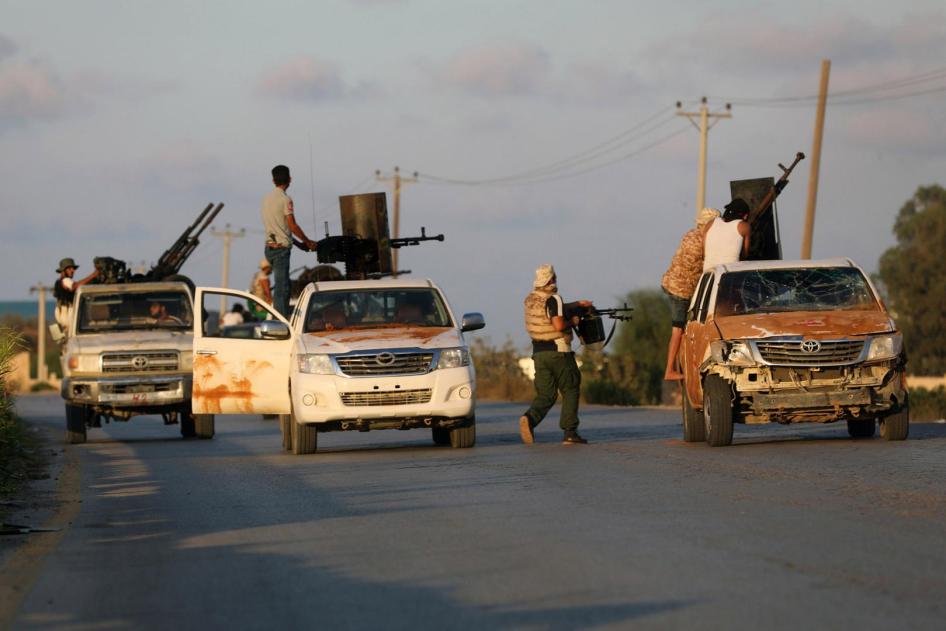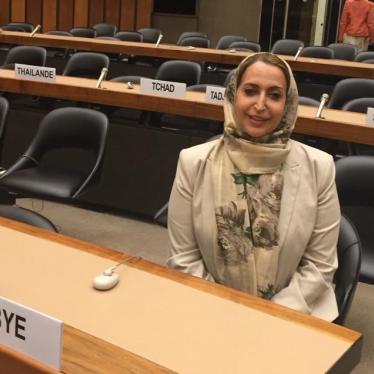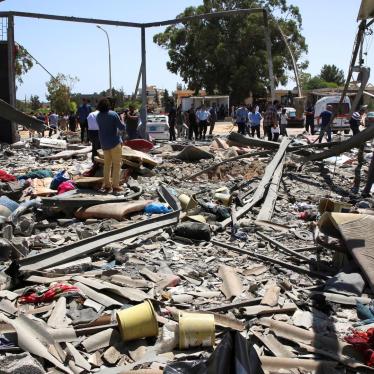The scars ran deep. His back was a maze of thick welts, thinner scars and parts that resembled small craters. His wrists and ankles were raw from where he’d been shackled and suspended from a ceiling for hours, and his limbs appeared limp and stretched. His eyes were expressionless. The torture destroyed me as a person, Ali[1] said.
Ali, 24, told me he had been tortured within an inch of his life in Benghazi. He was stopped at a checkpoint by an armed group affiliated with the Libyan National Army (LNA) who accused his brother of fighting against the LNA in Benghazi. No matter that his brother was 1,000 kilometers away in Tripoli. Ali said he barely made it out alive after three days of almost non-stop torture.
Sadly, his story is not unique. During the past eight years, as Libya researcher at Human Rights Watch, I have interviewed hundreds of victims of human rights violations, or their relatives, and have visited dozens of prisons, migrant detention centers and informal detention facilities.
The list of serious abuses is long and goes well beyond torture and arbitrary detention, including those arising from the 2011 war that ousted Muammar Gaddafi, the more recent conflicts in 2014 and the current conflict in Tripoli.
I have investigated the plight of thousands forcibly displaced from their homes in Tawergha by armed groups from Misrata, the vast majority of whom cannot return home; extrajudicial killings and enforced disappearances by groups linked with the LNA; and sieges by the LNA that left civilians without access to food, water or medical care.
In the ongoing Tripoli conflict, there is wanton destruction of private property and indiscriminate attacks against civilians by all parties.
Many more violations are the direct result of systemic failures of consecutive post-Gaddafi governments and their supporters during periods of peace. We visited people held in long-term arbitrary detention without judicial review, primarily because post-2011 governments failed to establish a functioning justice system. In Misrata, we interviewed torture victims in detention facilities run by the Justice Ministry, still bloodied after their ordeal. In Benghazi, we documented scores of politically motivated assassinations, including of activists and journalists, mostly by unidentified perpetrators where no one was held to account. In Tripoli, we met relatives and friends of victims of kidnapping and enforced disappearances by armed groups linked with the Government of National Accord (GNA).
In western Libya, we uncovered widespread abuses against migrants and asylum seekers by smugglers and the GNA-linked coast guards and prison authorities. Some were held in slave-like conditions.
Multiple armed conflicts and political rifts since 2011 have had a devastating effect on civilians. In the absence of central authority, armed groups have committed human rights crimes with impunity. Most notable are “Dignity” (Karama) the May 2014 military campaign by LNA commander General Khalifa Hiftar to take control of the eastern region to “root out terrorism,” and the ensuing war in Tripoli between competing factions, from which emerged three, then two, authorities, claiming legitimacy.
The situation has worsened since Hiftar’s April 4 war on Tripoli. The LNA, an armed group controlling eastern Libya and parts of the south and allied with the Interim Government, is trying to wrest control of western Libya from the competing, internationally recognized Government of National Accord. Over 100 civilians have been killed, thousands more displaced, and civilian infrastructure has been damaged.
Despite the magnitude of the human rights crimes in Libya, attempts to hold wrongdoers to account, in domestic and international courts, and through sanctions imposed by the United Nations Security Council, have failed to break the cycle of impunity.
Few cases have been heard by civil and military courts in Libya. The post-Gaddafi interim government, strongly supported by the UN and western governments, did not prioritize a functioning justice system. So thousands of people in east and west of the country remained in long-term abusive arbitrary detention without a hearing. Domestic courts, affected by political divisions and armed conflict, are barely functional, with procedures hampered by grave due process violations, including forced confessions, ill treatment, and lack of access to lawyers. In some areas, including the south, the criminal justice system has collapsed. Lawyers, judges and prosecutors are also prime targets of militias.
The prosecutor of the International Criminal Court (ICC) has a mandate to investigate war crimes, crimes against humanity and genocide in Libya yet the prosecutor has issued only one arrest warrant since 2011: against Mahmoud el-Werfalli, a commander linked to the LNA, for extrajudicial executions.
The UN sanctions have been underused: only eight people have been listed for individual targeted sanctions since the 2011 revolution, including two militia commanders and six people involved in trafficking. Attempts to list abusive warlords and officials have failed because powerful backers within the Security Council have blocked such designations. The UN Human Rights Council shut down its Commission of Inquiry on Libya in 2012 leaving inadequate public reporting on crimes committed by all sides in Libya.
Nor has Libya seen justice for crimes committed under Gaddafi’s rule. Although media reports that a Tripoli criminal court is investigating the June 1996 Abu Salim prison massacre in which 1,200 prisoners were killed, no one has yet been held responsible. Many who opposed Gaddafi remain missing, including prominent opposition members Jaballa Hamed Matar and Izzat al-Megaryef, who were arrested by Egyptian security forces in Cairo in 1990 and sent to Abu Salim. Lebanese Shia cleric Imam Musa al-Sadr disappeared in Libya in 1978; his fate remains unknown.
It will take strong political will to expose those behind the most serious violations and bring justice. The narrative that peace in Libya will come only through political and economic settlements and holding abusive warlords and officials to account is counterproductive, is ill conceived. Real peace depends on first seeing justice done. Libya urgently needs a robust investigative mechanism to establish responsibility for violations and to document and preserve evidence of these crimes – for example, an independent UN International Commission of Inquiry.
Peace and justice depend on each other. Ali was tired but he wanted me to document every detail that he could remember of his ordeal, and to see every scar. It mattered a lot that he could tell his story and know that someone would preserve it. Then maybe one day, those who tormented him would be arrested and sent to jail.
[1] HRW interview with Ali (name changed), October 2017, Tripoli, Libya.










